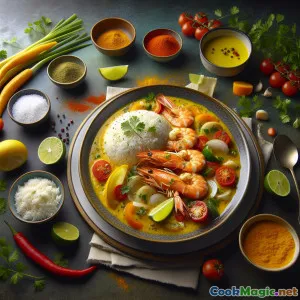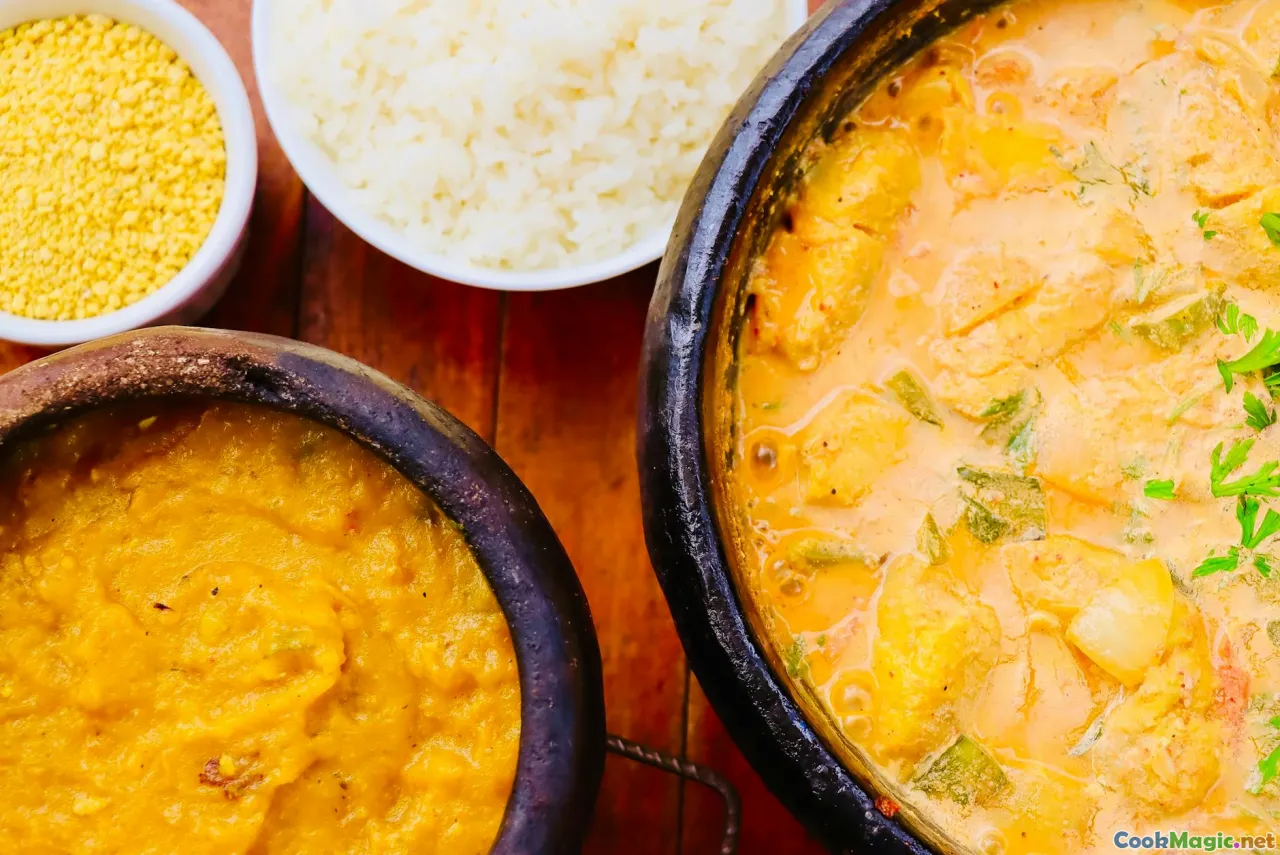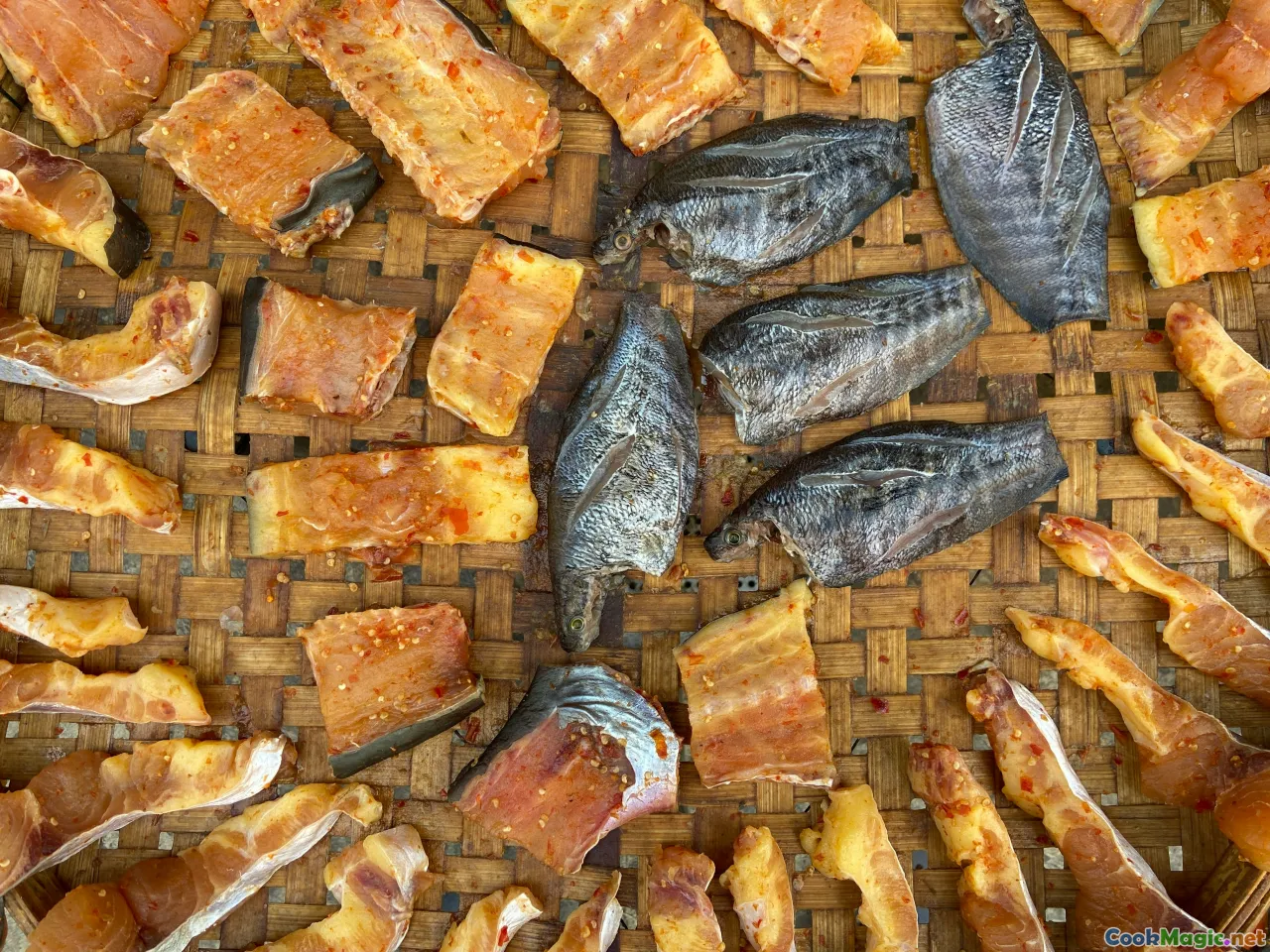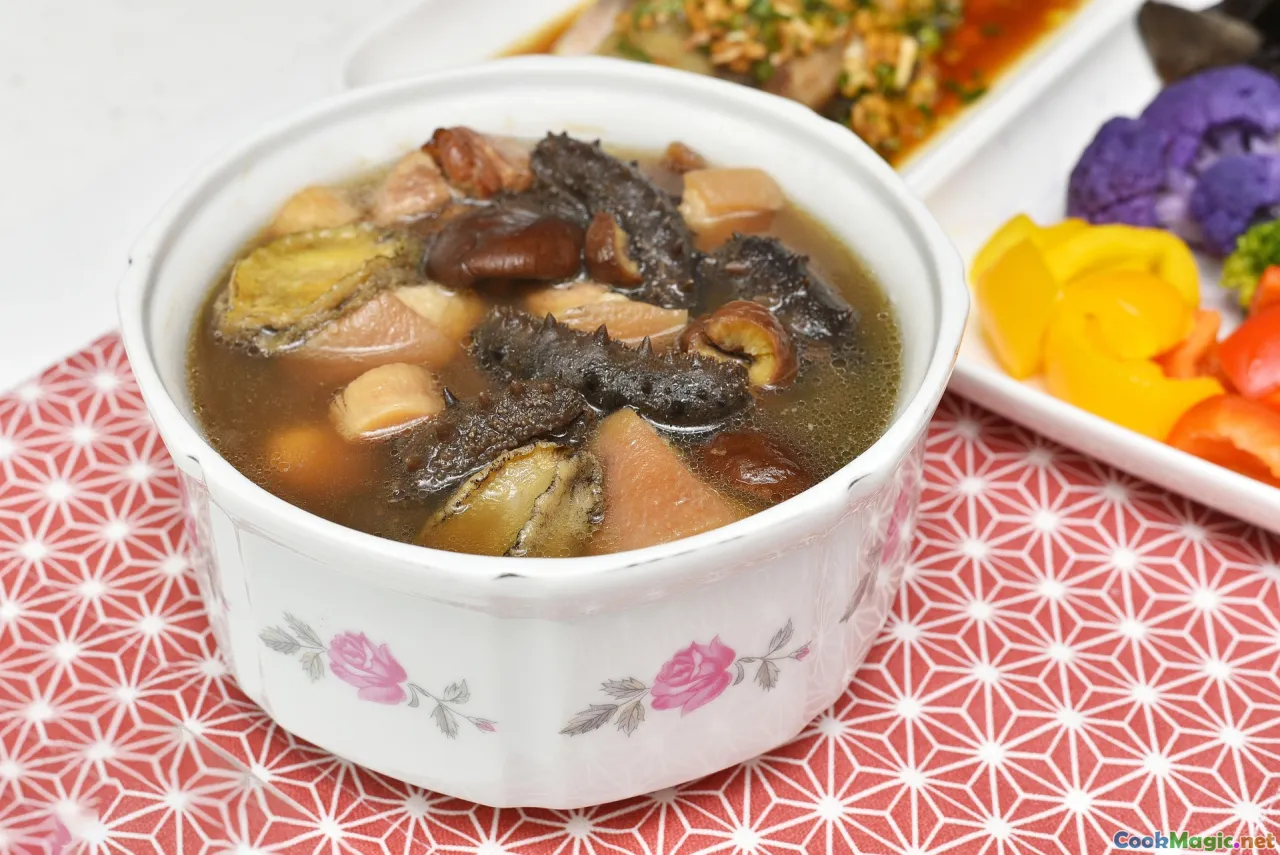
모케카 카픽사바 선라이즈: 활기찬 브라질 생선 스튜
(Moqueca Capixaba Sunrise: Vibrant Brazilian Fish Stew)
(0 리뷰)재료
-
600 grams 단단한 흰살생선 필레 (농어 또는 대구)
(Skinless, cut into chunks)
-
3 tbsp 신선한 라임 주스
(Juice of about 2 limes)
-
1.5 tsp 바다 소금
(Fine)
-
1 tsp 훈제 파프리카
(Sweet or hot according to taste)
-
0.5 tsp 신선하게 갈은 검은 후추
-
200 grams 생 왕새우 (껍질 벗기고 내장 제거)
(Optional, adds extra depth)
-
1 large 양파
(얇게 썬)
-
1 medium 붉은 피망
(Sliced in strips)
-
1 medium 노란 피망
(Sliced in strips)
-
2 large 잘 익은 토마토
(Sliced thinly or chopped)
-
4 cloves 신선한 마늘
(다진)
-
4 tbsp 엑스트라 버진 올리브 오일
(나누어진)
-
1 tbsp 덴데 오일 (브라질 야자 기름)
(Adds an orange hue; use sparingly)
-
200 ml 코코넛 밀크
-
250 ml 생선 또는 채소 육수
(저나트륨 선호)
-
0.5 cup 신선한 고수(실란트로) 다진 것
(장식을 위한 더 많은 양)
-
0.25 cup 다진 신선한 파슬리
-
2 stalks 파(초록 부분)
(얇게 썬)
-
1 tsp 오렌지 제스트
(For the sunrise touch)
-
4 cups 밥
(서빙하기)
(Skinless, cut into chunks)
(Juice of about 2 limes)
(Fine)
(Sweet or hot according to taste)
(Optional, adds extra depth)
(얇게 썬)
(Sliced in strips)
(Sliced in strips)
(Sliced thinly or chopped)
(다진)
(나누어진)
(Adds an orange hue; use sparingly)
(저나트륨 선호)
(장식을 위한 더 많은 양)
(얇게 썬)
(For the sunrise touch)
(서빙하기)
영양 정보
- 인분: 4
- 1인분 크기: 1 그릇 (300g)
- Calories: 490 kcal
- Carbohydrates: 31 g
- Protein: 37 g
- Fat: 23 g
- Fiber: 6 g
- Sugar: 8 g
- Sodium: 880 mg
- Cholesterol: 95 mg
- Calcium: 120 mg
- Iron: 3 mg
조리법
-
1 - Marinate the Fish:
Place fish chunks in a bowl. Add lime juice, salt, smoked paprika, and pepper. Gently combine and refrigerate while prepping the vegetables.
-
2 - Sauté Aromatics:
Heat 3 tbsp olive oil in a clay or heavy saucepan over medium heat. Add the onion, garlic, and spring onions. Sauté until just translucent and fragrant.
-
3 - Layer the 'Sunrise' Veggies:
Scatter a layer of tomato slices and then both bell peppers over the aromatics, letting their vibrant colors shine through. Sprinkle with coriander, parsley, and a pinch of salt. Drizzle with a little olive oil.
-
4 - Nestle in Seafood:
Arrange the marinated fish and prawns, if using, over the vegetable bed. Add a grating of orange zest to evoke a warm sunrise. Pour stock and coconut milk gently over.
-
5 - Simmer the Stew:
Drizzle with dende oil if using, then partially cover and let simmer on low for 20-25 minutes. The fish should be opaque and vegetables tender, with a rich golden broth.
-
6 - Finish and Serve:
Gently stir in half the fresh coriander. Taste for seasoning and adjust as needed. Serve hot in bowls, garnished with parsley or more coriander and a spoonful of sunrise-inspired orange zest. Enjoy with steaming rice.
Place fish chunks in a bowl. Add lime juice, salt, smoked paprika, and pepper. Gently combine and refrigerate while prepping the vegetables.
Heat 3 tbsp olive oil in a clay or heavy saucepan over medium heat. Add the onion, garlic, and spring onions. Sauté until just translucent and fragrant.
Scatter a layer of tomato slices and then both bell peppers over the aromatics, letting their vibrant colors shine through. Sprinkle with coriander, parsley, and a pinch of salt. Drizzle with a little olive oil.
Arrange the marinated fish and prawns, if using, over the vegetable bed. Add a grating of orange zest to evoke a warm sunrise. Pour stock and coconut milk gently over.
Drizzle with dende oil if using, then partially cover and let simmer on low for 20-25 minutes. The fish should be opaque and vegetables tender, with a rich golden broth.
Gently stir in half the fresh coriander. Taste for seasoning and adjust as needed. Serve hot in bowls, garnished with parsley or more coriander and a spoonful of sunrise-inspired orange zest. Enjoy with steaming rice.
모케카 카픽사바 선라이즈: 활기찬 브라질 생선 스튜 :에 대한 자세한 정보
Moqueca Capixaba Sunrise: Ode to Brazilian Mornings
The Moqueca Capixaba Sunrise is my unique interpretation of Brazil’s Capixaba-style fish stew, a dish that not only anchors the vibrant state of Espírito Santo but also brings the spirited hues of a sunrise to your dinner table. Imagine the colors you see as dawn breaks along the Brazilian coastline: glimmering orange, radiant red, and gentle yellow, all flowing together in a bowl. That’s the spirit captured in this recipe—a stew that feels like morning arrived in your kitchen!
The Story of Moqueca
Moqueca is more than just a fish stew; in Brazil, it’s a ritual born out of coastal abundance and centuries of Afro-Brazilian, Indigenous, and Portuguese influence. Traditionally, there are two iconic moqueca styles—Baiana (from Bahia) and Capixaba (from Espírito Santo). The Capixaba style swaps the heavy dende (palm) oil and coconut milk so prized in Bahia for lighter vegetable oils, garden-fresh herbs, and often a clay pot called panela de barro, imparting subtle earthen notes.
My ‘Sunrise’ variant puts a bright, modern English twist on tradition. The base of coconut milk nods to Bahia, but the perfume of smoked paprika, orange zest, and a spectrum of peppers regales the senses like an awakening dawn. Dende oil is included as an optional nod to Bahia, weaving together Brazil’s melting pot on one delicious plate.
Tips & Notes for the Perfect Moqueca Capixaba Sunrise
- Pick Fresh Seafood: Always opt for the freshest sustainable local fish or shellfish like snapper, cod, sea bass, or even shrimp. The dish sings brightest when your seafood shimmers.
- Layer, Don’t Stir: Instead of mixing ingredients, layer them. Start with aromatics on the pan bottom, then alternate vegetables and marinated seafood. This keeps flavors distinct yet harmonious.
- Customize Your Sunrise: Add extra bell pepper or even a touch of sweet chili for added warmth. Vegan? Replace fish with firm tofu and use vegetable stock.
- About the Pot: A traditional black clay pot enhances both flavor and presentation, but a thick ceramic Dutch oven or cast iron works almost as well.
- Serving: This stew loves plain steamed white rice or, for more aroma, coconut-lime rice. A spoonful of the orange, gently zested over the top, invigorates each bite with sun-kissed vibrancy.
Historical and Cultural Significance
Espírito Santo’s moqueca encapsulates centuries of living by the Atlantic: fishermen hauling the early morning’s catch, women simmering fresh tomatoes and peppers in earthen pots, whole families gathering for Sunday lunch. It is truly a dish of unity and hope, one threaded through weddings, birthdays, and barroom banquets. By giving the recipe a ‘sunrise’ interpretation—focusing on radiant, naturally bright vegetables and that distinct citrus highlight—the dish’s cultural story becomes accessible across continents, infusing English kitchens with Brazilian joy.
Unique Aspects & Personal Reflections
What really sets Moqueca Capixaba Sunrise apart is its blend of authenticity and creativity. The orange zest was inspired not by Brazilian cooks, but by witnessing golden morning light pour over English gardens—it felt only natural that such optimism belong in a dish so rooted in sunlight tradition. Smoked paprika plays a subtle role, reminiscent of glowing embers as the sun rises. Meanwhile, the optional inclusion of prawns and the creaminess of coconut milk bridges bonds—those between tradition and novelty, warmth and freshness.
This recipe soothes and excites, ideal for weeknights needing a bit of cheerful color, or weekends when you crave a show-stopping feast. Cook it as an ode to Brazilian culture, or simply for the way it brightens any meal with the beauty of sunrise—tangy, soulful, and ready to gather friends around the table.
Bom apetite!























